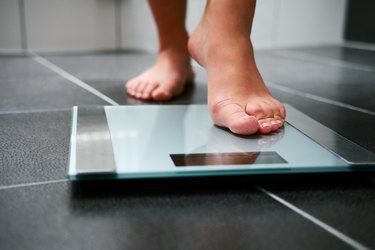
Going out has taken on a whole new meaning during the coronavirus pandemic, among fears of catching or spreading COVID-19. And as colder temps across much of the country nix outdoor dining and other relatively lower-risk activities, many of us face the potential of days, weeks or even longer without leaving the house.
Of course, it's extremely important to stick to the Centers for Disease Control and Prevention (CDC)'s safety guidelines for going out, even when that means, well, not going out. But what does staying in your home for long periods of time mean for your brain and body?
Video of the Day
Video of the Day
Get tips on how to stay healthy, safe and sane during the novel coronavirus pandemic.
"Light, noise, sound and different circumstances are all things that help us grow," psychotherapist Laura Dabney, MD, tells LIVESTRONG.com. Limit life to the confines of your four walls, and those kinds of healthy stimulation can easily fade away — not to mention set the stage for some unhealthy habits.
Here's a look at what can happen when you spend long stretches indoors, plus what you can do to avoid the possible consequences.
Your Mood Might Take a Hit
Staying inside can feel cozy for a day or two when the weather's bad. But after that, those hygge-like feelings may start to get replaced by cabin fever and, potentially, negative thoughts.
You’ll Start to Feel Crabby or Depressed
Being cooped up deprives you of access to the natural world and means you're more likely to experience the same exact things day in and day out. And that can be a recipe for feeling stagnant — and ultimately, pretty sad.
"Anxiety and depression, both of those things go up when you're stuck inside. Even if you're choosing to be stuck inside," Dr. Dabney says.
Even if it's just feeling the sun or wind on your face or hearing the birds sing, time spent outdoors is a serious mood-booster. One June 2010 study published in the Journal of Environmental Psychology found that exposure to natural environments enhanced vitality by as much as 40 percent, while spending time indoors had the opposite effect.
And those feelings can quickly start to snowball, especially when you're dealing with added stressors (like a pandemic). During the early days of the COVID-19 lockdown in China, a Psychiatry Investigation study found that the vast majority of adults spent almost all of their time at home, inside. Consequently, 60 percent of subjects reported feeling depressed, while 46 percent reported feeling irritable.
You'll Spend More Time on Devices, Which Can Create a Vicious Negativity Cycle
Chances are, endless time in the house means you're spending more hours scrolling through your phone. Of course, texting and seeing what your circle is up to on Instagram can help you feel more connected when you can't physically be with others. But spend too much time thumbing through Twitter or your news feed and it can have the opposite effect.
"When you use your phone temporarily to feel better, you eventually start turning to [it] when you don't have a pain, and that can lead to oversaturation and overstimulation, which contributes to a lot of mental health disorders," Dr. Dabney says.
Case in point? A review of 290 studies published November 2018 in the International Journal of Environmental Research and Public Health concluded that frequent mobile phone use is tied to an array of mental health issues, including stress and depression. What's more: Spending time on your phone typically takes time away from other activities that can improve mental health — like exercising, focusing on work or school or supportive social interactions.
You Probably Won't Sleep as Well
Depression and stress alone can zap your sleep, according to the National Sleep Foundation. So if being inside for long stretches affects your mood during the day, you'll likely find yourself tossing and turning at night.
And that's not the only factor. Even if you're feeling OK emotionally, lack of time outdoors can mess with your snooze time. Natural light plays a key role in helping the body maintain its normal sleep-wake rhythms, and a lack of exposure can throw those off and make it harder to sleep well, according to an August 2013 study in Current Biology.
Your Vitamin D Levels Could Fall
Our bodies make at least some of our vitamin D from exposure to sunlight. So depending on your diet, not leaving the house could mean you're missing out on the nutrient. That's especially true for older adults and people with dark skin, who aren't able to produce vitamin D from sunlight as efficiently, per the U.S. National Library of Medicine.
"It's not clear at which point lack of sun exposure would start to affect your vitamin D levels, but we do know this: Just spending 10 to 30 minutes in the sun most days of the week is enough to maintain adequate levels," says Ruby Shah, MD, an internist at Texas Health Presbyterian Hospital Plano.
Over time, logging less outdoor time than that could create a vitamin D deficiency, which can lead to a loss of bone density and up the risk for osteoporosis. Low D levels might also be tied to chronic health problems like diabetes and high blood pressure, notes the U.S. National Library of Medicine.
The good news? While being inside can affect your vitamin D levels, there are easy ways to ensure you're still getting the recommended 600 IU per day. Eat vitamin D-rich foods like fatty fish, egg yolks, mushrooms or fortified milk or cereal. And talk with your doctor about taking a vitamin D supplement, Dr. Shah recommends.
Your Weight and Overall Fitness May Slip

Staying indoors doesn't doom you to piling on excess pounds, but it certainly makes it a lot easier, Dr. Shah notes. After all, you've got all the snacks and comfort foods basically within arms' reach and not a whole lot else going on, so hey, why not nosh on some chips — or bake a batch of cookies?
Adding insult to injury is the fact that being inside usually means less exercise, which means fewer calories burned throughout the day.
"We tend to be less active indoors. When we're outside, we're more likely to walk and use our muscles, even if it's just walking to the grocery store," Dr. Shah says.
And that can add up: If you used to burn 300 calories walking to and from work every day and now only have to shuffle over to your desk, that could add up to a pound gained in less than two weeks if you don't alter your diet.
And all that time spent sitting at home doesn't just mean you're expending less energy. Before long, you might find that your fitness level — or even your range of motion — starts to diminish.
"Walking helps us use our muscles and keep them strong," Dr. Shah says. "Since we're walking less indoors, we're using our largest muscles — our legs — a lot less."
Your Immune System Might Falter
Stress and loneliness are two feelings that might reach all-time highs when you don't leave the house for long periods. And both can weaken your immune system — making you more susceptible to germs when you finally do venture out.
Plus, the researchers behind a December 2015 study in the Proceedings of the National Academy of Sciences found a link between loneliness and inflammation, which can increase the risk of chronic disease. And a July 2020 paper in Perspectives on Psychological Science found that interpersonal stressors, such as loneliness, are connected to increased risk of diseases including respiratory viruses.
Related Reading
OK, So What Can I Do About It?
Limiting indoor gatherings is a key way to prevent the spread of COVID-19 and reduce your chances of getting sick, according to the CDC. But that doesn't mean you need to actually stay cooped up in your house for days or weeks. You can — and should — make an effort to get out of the house regularly, for the sake of both your mental and physical wellbeing.
"Even if you can't socialize, it's absolutely worth just getting outdoors every day," Dr. Dabney says.
If it's too cold to spend a long stretch outside, bundle up and take a few short walks at points throughout the day. Raining or snowing? Grab an umbrella or some sturdy boots.
"You still want to get that stimulation of seeing things that are new and different," she notes. Like always, just remember to wear your mask and stay a safe distance from others.
And on those days when the weather is just too crummy to get out?
"You can be inside, but just be mindful," Dr. Dabney says.
Eat well and try to limit mindless snacking, and block out time for exercise every day — even if it's just doing a workout DVD in the basement. Try to rotate your activities, too, even if they feel the same-ish. Make a list of people to reach out to and try to connect with one each day, or take a break from reading on your Kindle to read from a paper book.
"Just changing up your stimuli will help," Dr. Dabney says.
Concerned About COVID-19?
Read more stories to help you navigate the novel coronavirus pandemic:
- Centers for Disease Control and Prevention: "Daily Activities and Going Out: COVID-19"
- Journal of Environmental Psychology: "Vitalizing effects of being outdoors and in nature"
- Psychiatry Investigation: "Mental Health Problems of Individuals Under the Stay-Home Policy"
- International Journal of Environmental Research and Public Health: "Mobile Phone Use and Mental Health. A Review of the Research That Takes a Psychological Perspective on Exposure"
- National Sleep Foundation: "Mental Health and Sleep"
- Current Biology: "Entrainment of the Human Circadian Clock to the Natural Light-Dark Cycle"
- U.S. National Library of Medicine: "Vitamin D Deficiency"
- Proceedings of the National Academy of Sciences: "Myeloid differentiation architecture of leukocyte transcriptome dynamics in perceived social isolation"
- Perspectives on Psychological Science: "Psychosocial Vulnerabilities to Upper Respiratory Infectious Illness: Implications for Susceptibility to Coronavirus Disease 2019 (COVID-19)"
Is this an emergency? If you are experiencing serious medical symptoms, please see the National Library of Medicine’s list of signs you need emergency medical attention or call 911.
